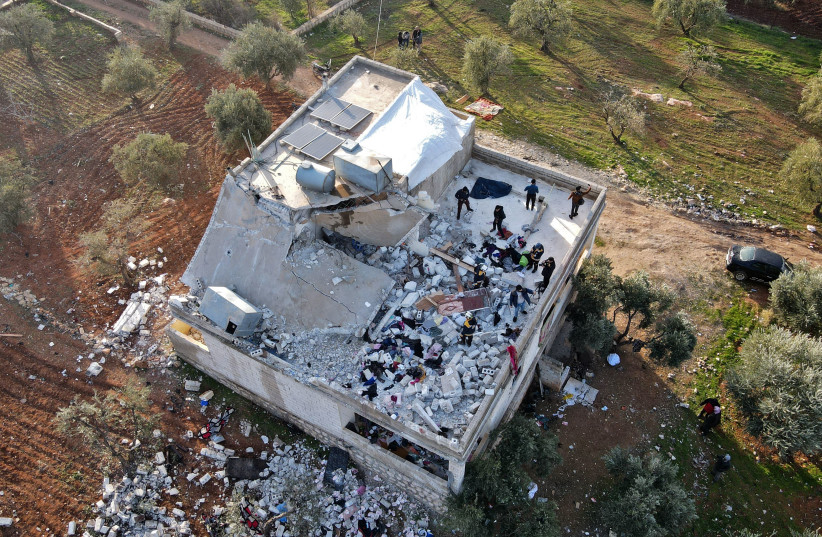US Special Operations commandos conducted a raid in Syria shortly after midnight on Thursday that resulted in the death of the “caliph” of the Islamic State group.
For more stories from The Media Line go to themedialine.org
“Last night at my direction, US military forces in northwest Syria successfully undertook a counterterrorism operation to protect the American people and our allies, and make the world a safer place. Thanks to the skill and bravery of our armed forces, we have taken off the battlefield Abu Ibrahim al-Hashimi al-Qurayshi − the leader of ISIS,” US President Joe Biden announced.
“All Americans have returned safely from the operation. I will deliver remarks to the American people later this morning. May God protect our troops,” he said.
A senior administration official said Qurayshi, a 45-year-old Iraqi-born Amir Mohammed Abdul Rahman al-Mawli al-Salb, died at the beginning of the operation when he exploded a bomb that killed himself together with members of his family, including women and children.
Rescue workers said at least 13 people died during the raid, which was carried out by helicopter-borne commandos in Atmeh, a town near Syria’s border with Turkey.

Dr. Hans-Jakob Schindler, senior director of the Counter Extremism Project (CEP) and former coordinator of the ISIL, al-Qaida and Taliban Monitoring Team of the UN Security Council, told The Media Line, “This seems to have been a combination of an air operation and special ground forces, which significantly reduces the risk to kill civilians.”
However, he added, “Every counter-terrorism operation always carries the risk of collateral damage. No intelligence information report is super-perfect.”
And most likely, Schindler continued, “The civilians announced killed in the news may actually be Qurayshi’s family.”
Qurayshi succeeded Abu Bakr al-Baghdadi, the previous leader of the organization who was also killed during a US military operation, in 2019.
Dr. Michael Barak, a senior researcher at the International Institute for Counter-Terrorism (ICT) at Reichman University in Herzliya, pointed out in an interview with The Media Line that Qurayshi was killed in the same area as his predecessor, in Idlib Governorate.
Schindler expressed astonishment because Qurayshi “was actually in the place where he was most likely to be.” Meaning that he would have thought the ISIS leader would have been better hidden somewhere else.
Idlib, he explained, is one of the only places in Syria that is not controlled by Assad’s government. And there is still an Islamic State structure in the area.
Barak said we can expect the Sunni Islamists to try to hit back. “We have to wait and see if ISIS will confirm this assassination, and then they will probably launch a series of attacks on Western targets in the Middle East.”
Schindler agrees, saying, “This is, of course, a motivation factor now for ISIS cells around the globe to respond in some kind.”
Anyhow, he said, “They [the Americans] took out a central figure in the ISIS network, which makes it worth the risk of retaliatory attacks.” He added that American forces and many civilians in the region are probably already on high alert.
As for the effect on ISIS of the leader’s death, Schindler said, “Taking him [Qurayshi] out is definitely a major hit for the organization but it is not the same as taking out Baghdadi [back in 2019].”
Schindler explained that today ISIS is a network-based organization, meaning it is no longer centralized as it was in Iraq and Syria in 2018-2019. It now operates through affiliates, sending them ideas and instructions. They preserve the brand, but also operate independently on a big scale.
And therefore, he said, “Temporarily this will mean a setback for the Islamic State but it is not an irreparable setback.”
Barak said it is too early to tell who will succeed Qurayshi at the head of ISIS.
However, Schindler believes that it will not take long until we know who the successor will be. “Most likely it is going to be an Iraqi, simply because there is a big structure in Iraq and ISIS is originally from that country, and they chose Qurayshi because of his tribal affiliation and lineage to the prophet.”
Schindler continued, “Despite the fact that the organization is now decentralized, its leader still has to have some basic elements such as lineage to the prophet and a suitable tribal affiliation.”
The Prophet Muhammad was a member of the Quraysh tribe.
Barak said killing Qurayshi would increase respect for the US in the region.
“This will improve the image of Biden’s administration and undercut negatively seen actions such as his rapid withdrawal from Afghanistan, which damaged the reputation of the United States,” he said.
The operation “shows that this administration is determined to fight terrorism,” Barak said.
Schindler added that because of its decentralized structure, many of ISIS’s affiliates, such as the Islamic State – Khorasan Province, its branch in Afghanistan as well as elsewhere in South and Central Asia, are gaining power in various ways, and a strike on ISIS’s core is not that damaging anymore.
“It is a significant success, but that doesn’t mean that we can now relax about ISIS,” he said.
